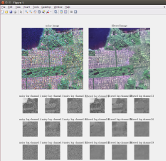[français]
MuLoG: MUlti-channel LOgarithm with Gaussian denoising
Description
 Results of MuLoG
Results of MuLoG
- Speckle reduction is a longstanding topic in synthetic aperture radar (SAR) imaging. Since most current and planned SAR imaging satellites operate in polarimetric, interferometric or tomographic modes, SAR images are multi-channel and speckle reduction techniques must jointly process all channels to recover polarimetric and interferometric information. The distinctive nature of SAR signal (complex-valued, corrupted by multiplicative fluctuations) called for the development of specialized methods for speckle reduction. Image denoising is a very active topic in image processing with a wide variety of approaches and many denoising algorithms available, almost always designed for additive Gaussian noise suppression. This algorithm proposes a general scheme, called MuLoG (MUlti-channel LOgarithm with Gaussian denoising), to include such Gaussian denoisers within a multi-channel SAR speckle reduction technique. A new family of speckle reduction algorithms can thus be obtained, benefiting from the ongoing progress in Gaussian denoising, and offering several speckle reduction results often displaying method-specific artifacts that can be dismissed by comparison between results.
- While a large diversity of speckle reduction methods exist for intensity images, only few can be extended to process multi-channel SAR images. In particular, extension of variational methods lead to challenging optimization problems due to the non-convexity of the neg-log-likelihood and the positive definitness constraint on the covariance matrices. Furthermore, signal and channel dependent variance lead to restoration results with an uneven suppression of speckle. This algorithm introduced a general scheme based on a matrix logarithm transform to approximately stabilize speckle variance and produce close to independent channels. Each channel can then be processed with a user-defined Gaussian denoiser. Upon re-iterating, a good fit of the restored multi-channel image with the Wishart distribution of input covariance matrices is enforced.
- Special care is paid to ensure that the method requires no parameter tuning other than possibly within the Gaussian denoiser, and that these parameters, if any, can be tuned once for all. The resulting generic method can then include Gaussian denoisers selected by the user and tremendously extends the set of available speckle reduction methods applicable to multi-channel SAR images. We believe that this offers several notable advantages: (i) the SAR imaging community will directly benefit from upcoming progress made in the field of image denoising; (ii) several images with reduced speckle can be produced by very different denoising algorithms, and these images can be compared to discard artifacts and confirm weak structures; (iii) this family of speckle reduction methods can serve as a reference to benchmark future specialized speckle.
- See also: NLSAR, NL-InSAR, PPB filter.
Associated publications and source codes
Associated publications/reports:-
Charles-Alban Deledalle, Loïc Denis, Florence Tupin.
Speckle reduction in matrix-log domain for synthetic aperture radar imaging
Journal of Mathematical Imaging and Vision, vol. 64, pp. 298-320, 2022 (Springer link, HAL)
-
Charles Deledalle, Loïc Denis, Sonia Tabti, Florence Tupin.
MuLoG, or How to apply Gaussian denoisers to multi-channel SAR speckle reduction?
IEEE Transactions on Image Processing, vol. 26, no. 9, pp. 4389-4403, 2017
- article IEEE Xplore
- preprint with high image quality (4.0Mb): pdf
- preprint with poor image quality (1.8Mb): HAL, ArXiv
- article IEEE Xplore
-
Charles Deledalle, Loïc Denis, Sonia Tabti, Florence Tupin.
Closed-form expressions of the eigen decomposition of 2 x 2 and 3 x 3 Hermitian matrices
Technical report (HAL version)
- Download Python MuLoG 2022 (recommended):
- Stable version
- Pip:
pip3 install mulog - Pypi: https://pypi.org/project/mulog/
- Bitbucket: https://bitbucket.org/charles_deledalle/mulog2022-python/src/v0.0.4/
- Pip:
- Development version
- Git:
git clone https://bitbucket.org/charles_deledalle/mulog2022-python.git - Bitbucket: https://bitbucket.org/charles_deledalle/mulog2022-python
- Git:
- Stable version
- Download MATLAB MuLoG 2022 (unsupported):
- Git:
git clone https://bitbucket.org/charles_deledalle/mulog2022.git - Bitbucket: https://bitbucket.org/charles_deledalle/mulog2022
- Git:
- Download MATLAB MuLoG 2017 (unsupported):
- Git:
git clone https://bitbucket.org/charles_deledalle/mulog.git - Archive: v1.1.zip, v1.1.tar.gz, v1.1.tar.bz2
- Bitbucket: https://bitbucket.org/charles_deledalle/mulog
- Git:
- Open-source software distributed under CeCILL license
Last modified: Wed Sep 27 04:30:58 UTC 2023